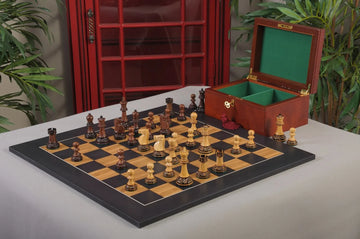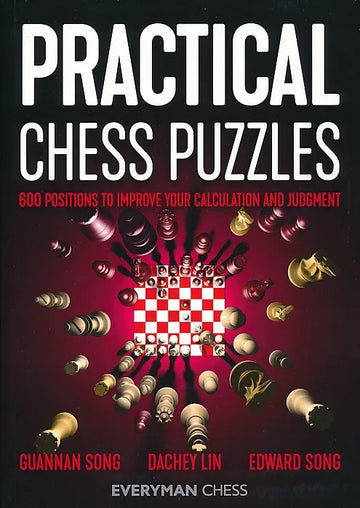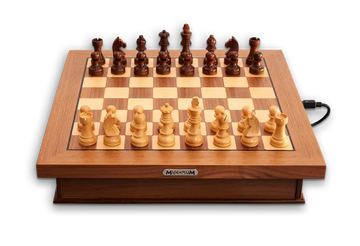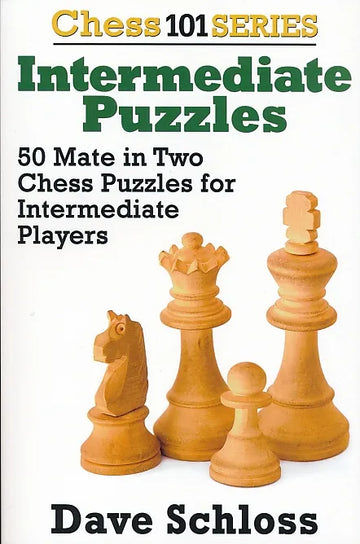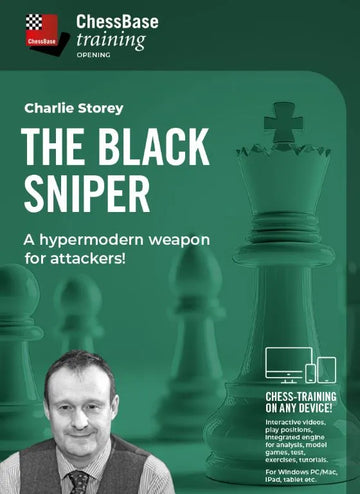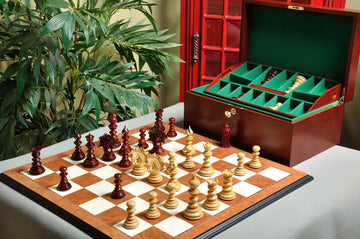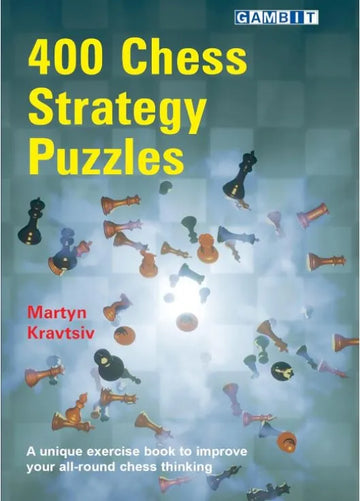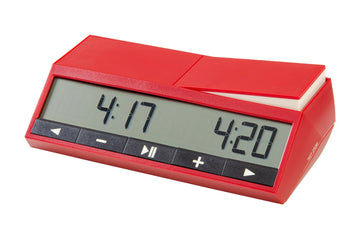Chess Blindness: What Is & How To Avoid It?
We have all been there; we think our position is great, everything is going well, and suddenly, out of nowhere, a bishop that is hiding out somewhere on the board next to yours captures your queen. Where did that piece come from? This phenomenon has many names: chess blindness. A tunnel vision, or just a blind spot in your tactical vision. But ultimately, it means one thing: you need to improve the way that you see the board.

What is Chess Blindness?
Ultimately, chess blindness is a mental lapse. A moment where you fail to see a possible move by your opponent. This can happen due to an over-focus on one's own moves, which we often call tunnel vision. It is a common problem for beginner chess players. Tempo is incredibly important in chess for a reason. If you forget to consider your opponent moves within your own calculation, it will bite you. Now, this is not just a problem for beginners; in fact, many times when a grandmaster blunders, it is because of this very thing. It’s not that they forget what a pin or fork is, but they fail to even stop for one moment and consider their opponent's move. That is called chess blindness.
Take a look at this example: Black just played Qxd6, capturing an opponent's knight. What did their chess blindness cause them to miss?

What Causes Something Like Chess Blindness?
I believe there are three main causes of chess blindness and tunnel vision.
1. Mental Fatigue and Mental Exhaustion.
A chess game can be a long and difficult journey. If you are playing in a classical tournament or even just nearing the end of a long bullet session, fatigue can impact your play in this manner. Taking in the whole board and thinking through your opponent's moves takes effort. When we get fatigued, some part of our play will suffer, and ultimately, chess blindness is a failure to calculate.
2. Over-focusing on One Plan While Missing Alternatives.
Another reason for tunnel vision can be that you get too excited about your own plans to consider your opponent's ideas. They are trying to win also! Do yourself a favor, especially if you have the time on your clock, and calculate through what your opponent may be threatening instead of just focusing on your own attacks.
3. Time Pressure and Stress.
We all blunder in time pressure, but chess blindness especially becomes dangerous in those stressful moments. Part of why advanced players are so good, even in faster time controls, is that they have trained their intuition to be completely aware of the board, and they intuitively check for their opponent's ideas even in time scrambles.
Examples in Play
Missing a simple checkmate or capture is one of the most frustrating feelings in chess. In the position below, black just played Nd6, but if they had taken a moment to look at the full board and not have tunnel vision, they could have stopped their opponent's threat. It may not always be a checkmate that you blunder, either. Even going down a piece, all because you are over-focused on your own ideas, can be game-changing. What did black miss here when they played Rd2?

How to Prevent Chess Blindness
What can you do then to avoid this kind of blunder? Well, there are a few things you can do to reduce the odds that this happens, and this one solution will help you avoid blunders like this in the moment.
- First, you can take breaks and stay mentally fresh. While this may not always be possible if you are in the middle of three rounds in one day and you can’t take a break, but you can do your best to prepare yourself during tournaments like that as well by bringing snacks, or planning when you can take a quick mental break ahead of time.
- Trying to remain calm in stressful moments can help keep you from just focusing on your own moves. So, try breathing, staying aware of the whole board, and remaining calm even during those stressful moments.
- Most importantly, though, is having a routine way that you avoid blunders by looking at all of you and your opponents' forcing moves. Some people call these kinds of methodologies “blunder checks,” but they can also make sure that you don’t miss a good move for yourself as well! If you are scanning the board for any possible check your opponent may have in a position, then you will likely spot the sneaky hidden bishop that is about to attack you with a discovery!
The key is to prepare well for your games by being at your best and ready to play, and then during the game, doing your best to keep a level head while also looking through all of your opponents' forcing moves.
What are Forcing Moves?
Forcing moves are your opponents' checks, captures, and threats. By scanning for these kinds of moves that your opponent might play, you are then avoiding any surprise checkmates, but also any tactics. All tactics come from either checks, captures, or threats to your pieces. Having an extra awareness of your king and king safety can also help reduce board blindness while also helping you to keep your king safer.

Even grandmasters can fall for basic tactics if they don’t stop to consider their opponent's ideas. In this position, black, Grandmaster Anatoly Karpov, just played Bd6, completely forgetting to look at his opponent’s threats in that position. What did he miss?
Calculation Exercises
If this kind of blunder is a recurring problem for you, I suggest also working on your calculations. It’s possible that you are not fully seeing the board in your calculations, and the pieces are surprising you. So, how do you practice something like calculation? Find a puzzle that will take multiple moves to solve, but you are going to try and find the solution without moving any pieces, without drawing any arrows, and without plugging it into a chess engine after two minutes of frustration. If that is a new idea for you, then this could be why you are struggling with chess blindness. Not seeing the board well, just after a few moves into a calculation, can lead to nasty surprises like hanging pieces or unexpected checkmates. Try looking through all of the forcing moves you and your opponent have in this position, and calculate some candidate moves.
Here is another example below. White has a strong position; can they proceed with their attack? Or do they need to play a defensive move first? This is the kind of question you will learn to ask yourself instead of just blindly rushing into an attack without thinking of your opponent's moves.

Out of the Tunnel and On to Victory
You did it! You have learned how not to suffer from tunnel vision or chess blindness. It will still happen in your games, but if you regularly look through your opponent's forcing moves, asking yourself what your opponent may play if you play the move that you are calculating, then you will drastically reduce the number of chess vision blunders. Hopefully, you will be the one using that bishop sniper from across the board to pick up your opponent's pieces. Then, all you will need to do is convert your advantage into a victory. That’s easy, right?
Frequently Asked Questions
The best solution for chess blindness is to force yourself to look through your opponents' forcing moves before you make a move. Do they have any checks, captures, or threats in the position? Trying to play the best move for your opponent in your calculation is better than having to play what you hope they will play.
Ultimately, chess blindness is a mental lapse, a moment when you fail to notice a move available to your opponent. It often occurs when someone who has played chess focuses too much on their own strategy, developing a kind of tunnel vision that makes it easy to overlook opponent pieces. This is a common issue, especially for beginner players.
To prevent chess blindness, always check your opponent’s forcing moves. Look through all checks, captures, and threats before making your move. Stay mentally fresh, stay calm under pressure, and practice board visualization through calculation exercises.
Forcing moves are your opponent’s checks, captures, and threats. By identifying these moves, you can avoid blunders by always asking yourself what your opponent will play! This helps you stay aware of potential dangers and ensures you don’t overlook basic tactics.
Tunnel vision! This is where you focus too much on your own plans and overlook theirs. Mental fatigue, stress, or rushing through moves can also contribute to blunders in board vision. Taking time to carefully scan the board and consider your opponent’s possible responses can help reduce these mistakes.
Take a chess puzzle that is a bit out of your range of difficulty, something you aren’t solving immediately, and give yourself ten minutes to try and calculate through all the forcing moves in the position without moving any pieces or drawing arrows. This will help you calculate and see tactical patterns (and you will probably solve it before the ten minutes are up). You can set the puzzle up on a real board for extra OTB, over-the-board, practice to stay focused!

